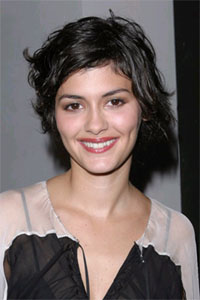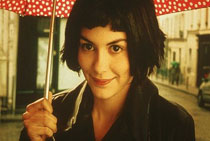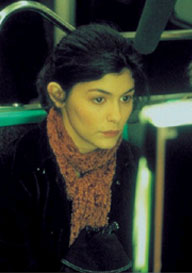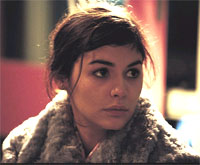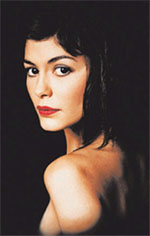

![]()
![]() Frankie
G
Frankie
G
![]() Eugene
Levy
Eugene
Levy
![]() Christopher
Guest
Christopher
Guest
![]() Dennie Gordon & ...Dawn
Taubin
Dennie Gordon & ...Dawn
Taubin
![]() Steve
James
Steve
James
![]() Lisa
Cholodenko
Lisa
Cholodenko
![]()
..Gary
Dretzka
..Leonard
Klady
..David
Poland
..Ray
Pride
..Patricia
Vidal
July 15, 2003
Just for the record: Yes, Audrey Tautou is every bit as cute, charming and innocent looking in person, as she was playing the title role in Amelie. Why is that relevant? Well, because it's difficult to imagine anyone being as cute, charming and innocent as Amelie Poulain of Montmarte. Indeed, Tautou might even be a bit more naive than Poulain.
As proof, between interviews, Tautou repeats a story she told the day before on The View.
Like Amelie, the 5-foot-3 brunette moved to Paris at an early age in order to make her mark on the world as a comic actor. Her apartment was unremarkable, but Tautou recalls being stunned by the extremely large number of beautiful, long-legged women she'd encounter every day, while strolling through her neighborhood. Fearing that competition for work would be too fierce, she thought about turning tail and returning home to Beaumont, where every woman wasn't drop-dead gorgeous.
In wasn't until someone pointed out that she was living on the same block as the Elite modeling agency that Tautou stopped worrying and learned to love Paris.
Her first big break came in 1998, after she was picked best young actress in the Jeune Comedien de Cinema Festival. This brought her to the attention of director Tonie Marshall, who offered her a key role in Venus Beauty Institute. Her portrayal of an impressionable teenage beautician, who falls for a much older man, brought her a Cesar as Most Promising Actress.
Tautou received another Cesar nomination for her work in Amelie, which became an international sensation. Roger Ebert called it a "delicious pastry of a movie, a lighthearted fantasy in which a winsome heroine overcomes a sad childhood and grows up to bring cheer to the needful and joy to herself. You see it, and later when you think about it, you smile. Audrey Tautou, a fresh-faced waif who looks like she knows a secret and can't keep it, plays the title role, as a little girl who grows up starving for affection."
Tautou has since appeared in God Is Great, I'm Not, He Loves Me ... He Loves Me Not and L'Auberge Espagnole, and she's pretty much wrapped up work on four other films. Stephen Frears' engrossing immigrant drama Dirty Pretty Things, opening Friday, represents her first English-speaking role.
Dirty Pretty Things is set in contemporary London, in and around a hotel maintained by immigrants from all corners of Europe and Africa. Newcomer Chiwetel Ejiofor plays Okwe, a Nigerian "illegal," who, when he isn't driving a min-cab, works as an overnight clerk in the hotel. Tautou is Senay, a young Turkish woman, also undocumented, who struggles to make a living as a maid.
Their corrupt boss, portrayed by Sergi Lopez (With a Friend Like Harry), uses empty hotel rooms as a staging ground for an extremely lucrative criminal activity that borders on urban myth. Because his employees are afraid of being sent back to their homelands, they keep quiet about what they see and hear until their own lives are put in jeopardy.
Equal parts murder mystery, political thriller and love story, Dirty Pretty Things is the perfect antidote for this summer's plague of unoriginal sequels and comic-book movies. Frears has elicited some of the finest performances of the year, from a cast of actors largely unknown on this side of the pond. It also represents the first produced screenplay by Steven Knight, co-creator of Who Wants to Be a Millionaire?
Tautou was interviewed last week, in a hotel in Pasadena (so as to be close to the Seabiscuit junketeers). Although her English is passable, she was exhausted from jet lag and her busy interview schedule, and requested her answers be translated into English.
MOVIE CITY NEWS: My notes say that you're fluent in German - and, of course, French - but you were required to learn English for Dirty Pretty Things. How difficult was that for you?
AUDREY TAUTOU: It took an enormous amount of work, especially considering I had to learn how to speak English with a Turkish accent. I knew very little English to begin with, and, then, I only had three weeks to get it right.
As part of my preparations, I asked to meet some Turkish women, so I could learn the rhythms of their speech. That was in Stoke-Newington, a neighborhood with a large Turkish population.
MCN: I have to admit that I missed the first few minutes of Dirty Pretty Things, mostly the opening credits, and it didn't dawn on me until the closing credits that Audrey Tautou was playing Senay. I thought I was watching an actress who could possibly have been of Turkish or Arab ancestry.
AT: I had an extraordinary speech coach, Penny Dyer. Every time we met with the Turkish women, she would tape the conversations and replay them over and over for me. That was the first step.
The second step involved going over the entire script and classifying each piece of dialogue, in terms of vowels, consonants and syllables. I needed to hide my French accent, and then add a Turkish nuance and color to it.
MCN: Sort of a paint-by-numbers approach to dialogue.
AT: I would use differently colored magic markers to highlight every vowel sound, so, when I saw them in the script, I knew what the words were supposed to sound like. The color would remind me of the sound.
The most difficult thing for me was not knowing if I was saying something right, or not, because I knew so little English to begin with. I had nothing to compare it with, and had to trust the preparations and repetition.
MCN: It must have felt as if you were flying without a net sometimes.
AT: I didn't dare change anything or improvise. I had to completely trust Stephen and Penny. I was dependent on them.
MCN: They must have loved that. How familiar were you with Okwe and Senay's predicament, as illegal immigrants, though?
AT: I think their situation is universal - whether it involves undocumented workers in England, France or America. Most of us aren't aware of the underground world depicted in the movie, which exists side by side with our own, because it is under our radar, and we can pretend it doesn't exist.
We don't know what it means not to have an identity ... to be an immigrant and be lost in that world. We don't even understand what it means to survive in that way.
MCN: In Bread and Roses, Ken Loach used men and women who actually had participated in the "Justice for Janitors" movement in L.A. The women working beside Senay in the sweatshop didn't look as if they'd spent much time in acting classes.
AT: It wouldn't surprise me to learn that some of those women were in the same situation as Senay. A lot of the people who live in that neighborhood aren't carrying legal documentation.
MCN: You and Chiwetel display an amazing chemistry when you're on-screen together. Have you seen anything he'd been in before taking the role?
AT: No, I met him the first time when we started making this movie, and I think it was his first film. We got along very well together.
(Ed. Note: Though known primarily for his stage work, Ejiofor has appeared in Amistad, Greenwich Mean Time and It Was an Accident.)
MCN: How did Stephen describe Senay to you?
AT: He told me that Senay was much stronger than she thought she was. Her religion and her culture permeated who she was, and her relationship with Okwe.
Senay was a virgin and very pure - she didn't understand why love wouldn't be enough to carry them through whatever problems he had left behind in Nigeria, where he had been a doctor. Because of her religion, she felt there had to be purity in any relationship between a man and a woman.
MCN: You don't meet very many virgins in the movies these days, except when they're the brunt of some joke in teen comedies.
AT: It's hard for us to understand her feelings because we're from a different culture. She was very protective of her virginity. This is something I didn't have to discuss with Stephen because it was all there in the script.
MCN: What is your ethnic background?
AT: Everyone thinks I have an ethnic origin, and could be from North Africa or parts of Asia, or Italy and Spain. But, as far as I know, I'm 100-percent French.
MCN: Ludivine Sagnier told me recently that her American agent kept trying to convince her to accept jobs in dopey teen comedies. You're even quoted as saying, "I wouldn't mind being in an American film for a laugh, but I certainly don't want to be in Thingy Blah Blah 3, if you know what I mean."
AT: (Laughs) I haven't gotten an American agent yet, so I'm not in the same position. I'm not sure I'm quite ready to have someone be a prospector of jobs for me, because I believe there's some kind of destiny involved with meeting people ... some things are just meant to happen.
I've had a few opportunities, but it takes a lot of guts to do something big in English. I also believe there has to be some kind of a correlation - a truth - between who I am and what I can play.
© 2002. Movie City News. All Rights Reserved.
